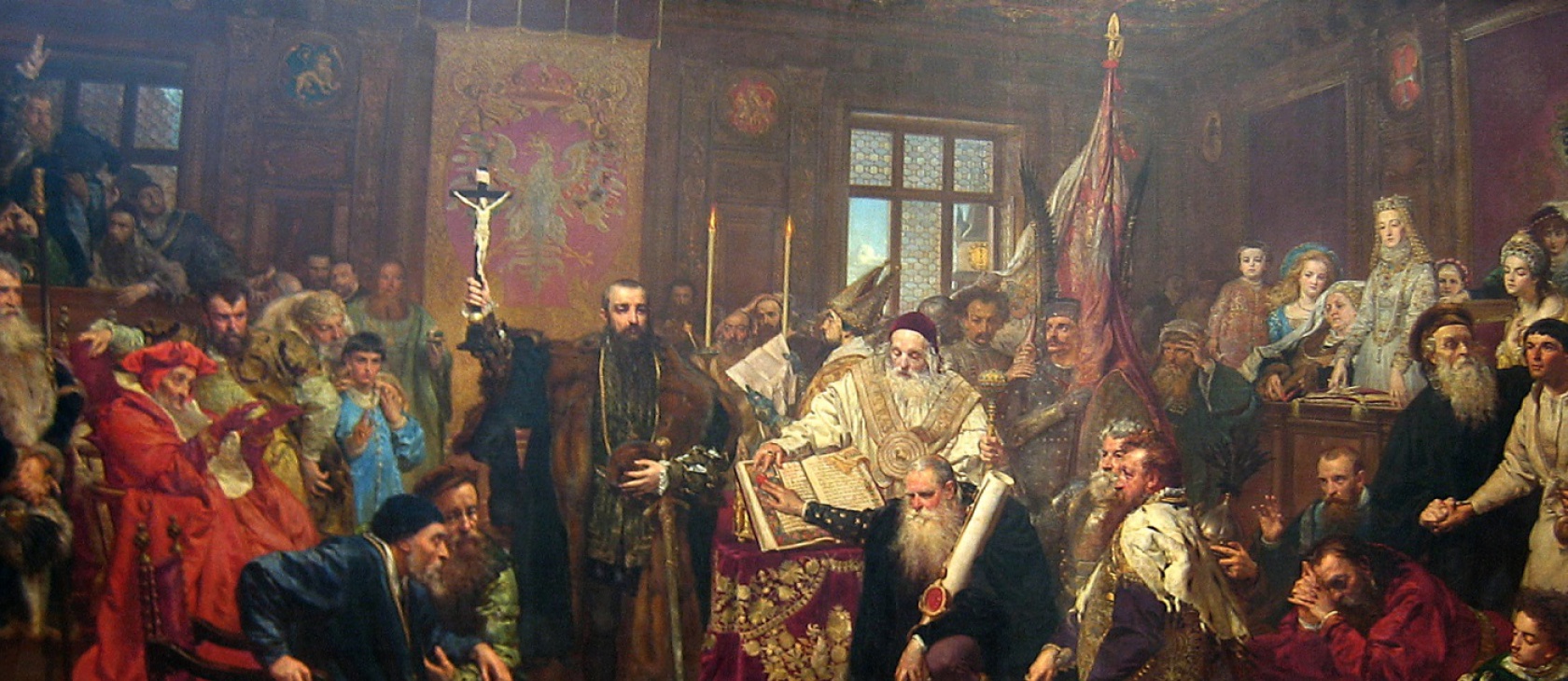The problems of the modern West are the same as those that once troubled the Polish-Lithuanian Commonwealth: the erosion of the rule of law, a disengaged elite produced by cronyism, a poor economy, a lack of respect for entrepreneurship, the destruction of the middle class, and seemingly endless wars.
These troubling issues sound startlingly contemporary. Certain historical phenomena repeat themselves and, although the main roles are taken by different actors, they share the same librettos. Though the times and the historical contexts are different, we can learn a valuable lesson from the collapse of the Polish-Lithuanian Commonwealth.
Any complex historical event has numerous causes. The issues discussed below are not intended to be exhaustive, but they offer useful lessons for today. Interpreting history through the axiological perspective of classical liberalism and the high value placed on human dignity (which developed in the Western world) allows us to spot the mistakes of the past - and recognise their echoes in the present.
“The Most Serene” Commonwealth (Serenissima)
The Polish-Lithuanian Commonwealth – sometimes called Serenissima (“the most serene”) – had several features that made it a remarkable country. It was located mostly in the Eastern Europe, but its culture was based on the Roman republican tradition and the Western model of Christianity. It was a multinational state that allowed a considerable scope of social freedom, as compared to the rest of Europe. Most of all, this country was founded on the basis of an agreement that the vote of each and every member of the political community – comprised solely of the Polish and Lithuanian nobility – was of equal value.
We can learn a valuable lesson from abandoning basic republican virtues and the spirit of entrepreneurship.
From today’s perspective, placing the nation's full political power into the hands of only six-to-eight percent of its citizens is not impressive. Nonetheless, compared to the European states of that time, such a large country operating on non-absolutist basis was a rarity. It is also worth noting that, in adherence with the principle of subsidiarity, local authorities exerted significant power over regional issues, enabling a greater number of citizens to take part in their own civic life.
From 1505 onward, the king was not allowed to pass any laws without the approval of the parliament, the Sejm. By the end of the sixteenth century, the king had to be chosen by a democratically constituted representation of all noblemen – a law to establish, in its words, “free election.” After being chosen as king, the ruler was obliged to sign declarations guaranteeing, not only fulfillment of the “campaign promises” that he made to the citizens, but also to reaffirm the rights and freedoms of the nobility. If he violated any of the pledges entrusted to him, the agreement upon which he was granted the ruling power ceased to apply; the noblemen were then authorized to use force, to revolt, against him.
It is true that during this time the country experienced crises, wars, and interregna – like any other European country of that time. But the Polish-Lithuanian Commonwealth uniquely saw these result in its neighboring states dividing it into three parts between 1772 and 1795.
How was it possible for the leading regional power to fall into oblivion within mere generations of its greatest triumphs?
Factor #1: Cronyism and the erosion of the rule of law
The fall of the Commonwealth of Poland had several facets, one of them being an ideological crisis. The community of noblemen was based upon their equality and republican values, like respect for the rule of law. Such an ideological keystone was necessary in the face of the king’s limited power. The nation fared well only as long as the political elite held to these ideals.
In effect, the statute books were erased by cronyism.
The noblemen, who enjoyed equality before the law but not economic equality, began to divide more strikingly into rich and the poor. The rich started to reshape the politics of the country as they pleased, without considering the will of the whole community. The nobility refused to control itself and instead, in the seventeenth century, magnates – the richest and most influential of nobles – started to form independent power centers. Subsequent monarchs approved this arrangement, in order to rule with the backing of a few of the richest oligarchs. The oligarchs exercised the critical voice in electing kings, passing new laws, and executing the laws already in existence.
The rule of law began to disappear. One local governor, Samuel Łaszcz of the Ovruch district, was rumored to line his coat with judicial sentences he refused to impose. In effect, the statute books were erased by cronyism.
Factor #2: Disdain for the entrepreneurial vocation
In his work The Wealth of Nations, published four years after the first partition of the Commonwealth of Poland, Adam Smith wrote, “In Poland there are said to be scarce any manufactures of any kind, a few of those coarser household manufactures excepted, without which no country can well subsist.” The numerous wars, the constant rivalry with Sweden over Gdańsk, and the attitude of the political elite toward resource management all resulted in the production of only the least refined goods, mostly destined for personal consumption or trade within the producer’s immediate community.
It is likely that the economy of the Commonwealth of Poland and Lithuania would have been more efficient, better adjusted, and more productive had business and entrepreneurs not been held in such low esteem. There were only three forms of activity considered worthy of a nobleman: politics, war, and agriculture (with the production actually carried out by serfs on estates known as latifundia). Trade was belittled as an activity reserved for the Jews. Making money on something other than war, politics, or farming was shunned among upper-class society.
Were other European countries any different? Only in England did the nobility willingly engage in trade. But in other countries, especially in Western Europe, the burden of this activity was placed on the middle class, which eventually grew into the bourgeoisie.
Factor #3: Endless warfare
Although the Commonwealth of Poland was an important grain producer, its export and production flourished only during peacetime. Worse, the European-wide economic crisis of the seventeenth century crushed even this market. Constant economic raids of larger cities by the military also distorted trade. Long and lasting wars against neighboring countries, as well as revolts in Ukraine, destroyed the notion of the common good.
Lessons for modern republics
Most societies divided into two groups: the very rich and the very poor. The existence of a durable and prosperous middle class is historically anomalous. It develops only alongside such factors as the stable and impartial administration of justice, respect for private property, and one of the key concepts of Christianity: respect for human dignity. These conditions long held sway in the Commonwealth of Poland. The erosion of the rule of law, endless wars, and the emerging oligarchic system superseded these values.
Is the Polish and Lithuanian nobility itself to blame? Yes and no. They discarded values that have come to be cherished by modern scholars as the bases of liberty. The final blow may have been delivered from the outside. However, the Commonwealth of Poland and Lithuania’s final partition would never have been carried out were it not already rotting from the inside.
This is a valuable lesson for citizens of the modern West. Abandoning virtues such as the rule of law, decentralization, political equality, a strong civil society, and respect for the human person does not make society less dependent on an underlying moral code. It only assures these values will be replaced by other, less beneficial, moral concepts – and the tyranny they produce.




